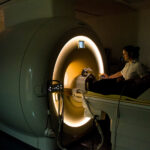Manchester has been chosen to be one of just seven centres of excellence in a UK-wide network that will accelerate advances in radiotherapy research. The Manchester centre has been awarded Radiation Research Unit status with funding for both research groups and infrastructure. Cancer Research UK is investing a total of £56 million in Cancer Research UK RadNet – the charity’s largest ever investment in radiotherapy research.
We are very proud that Manchester has been awarded this grant to bring the next generation of radiotherapy treatments to patients sooner. The funding will support us to develop new radiotherapy technologies to help more people survive cancer, with fewer side effects and a better quality of life after treatment.
Professor Robert Bristow
Director of CRUK Manchester Centre and CRUK RadNet Manchester
Manchester scientists and clinicians have been awarded a major cash boost from Cancer Research UK to pioneer new radiotherapy technologies and techniques that could help more people survive cancer in the future.
Experts from the Cancer Research UK Manchester Centre are set to receive £16.5 million over the next five years to develop new state of the art radiotherapy treatments to be delivered at the world-renowned Christie NHS Foundation Trust.
Manchester has been chosen to be one of just seven centres of excellence in a UK-wide network that will accelerate advances in radiotherapy research. The Manchester centre has been awarded Radiation Research Unit status with funding for both research groups and infrastructure. Cancer Research UK is investing a total of £56 million in Cancer Research UK RadNet – the charity’s largest ever investment in radiotherapy research.
In collaboration with The Christie, the funding will support University of Manchester researchers to use advanced radiotherapy technologies such as proton beam therapy, MR-Linac machines which combine an MRI scanner with a radiotherapy machine to make treatment more precise, and FLASH radiotherapy which delivers ultrahigh radiation doses in fractions of a second. Scientists and doctors will also work to personalise radiotherapy in combination with new treatments. For example, one of the aims is to identify new biomarkers that can be used to predict how patients will benefit from having immunotherapy with radiotherapy.
Professor Rob Bristow, Director of the Manchester Cancer Research Centre and Chief Academic Officer at The Christie, is lead researcher for the centre which could help to save the lives of more people with cancer in the city – and across the UK – in the future: “We are very proud that Manchester has been awarded this grant to bring the next generation of radiotherapy treatments to patients sooner. The funding will support us to develop new radiotherapy technologies to help more people survive cancer, with fewer side effects and a better quality of life after treatment.
“Our work will look at how the latest technologies can work in tandem with other therapies, including immunotherapy. In addition, by identifying the biological indicators of cancer success or failure, we hope to increase personalised treatment to patients. In Manchester, many of our patients have pre-existing medical conditions and our unique programme of research will help us to decide on the most suitable treatment for them.
“We will also be delving further into the underlying biology of the tumour to find ways of preventing tumours from spreading and how to reduce the side-effects of treatment. All of this is only possible with the infrastructure and expertise we have on hand here in Manchester.”
Cancer Research UK and the Christie supported some of the earliest research into the treatment of cancer with radiation and pioneered the first use of radiotherapy in the 1920s. In its simplest form, this treatment works by blasting tumours with x-ray radiation, killing cancer cells by irreversibly damaging their DNA. Today, over 130,000 patients are treated with radiotherapy on the NHS every year.
Navigation
RadNet
Discover more about the themes of CRUK RadNet Manchester.
Radiotherapy BioAdapotion
Discover more about our research in an area that plays a vital role in the treatment of cancer and nearly 50% of people receive at some point during cancer treatment.
News
Navigate back to the News homepage.



